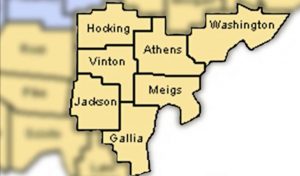Athens County educators work on multiple fronts to address the increase of mental health cases in schools
By: Jack Demmler
Posted on:
ATHENS, Ohio (WOUB) – Schools throughout southeast Ohio are experiencing an increase in issues related to the mental health of their students.
Many are seeing an increase in cases related to anxiety and depression since the start of the COVID-19 pandemic.
“What we have been seeing the last two school years is that it starts earlier in September that we get the referrals,” said David Schenkelberg, chief clinical officer at Hopewell Health Centers in Athens. “The intensity of the referrals are at a higher pace throughout than they have ever been before.”
Schenkelberg said the lockdown of schools is one of the biggest factors.
“There was a disruption in that,” Schenkelberg said. “That disruption created problems with mental health, social connectedness, ability to develop some of those social and emotional aspects.”

“Not only were these young children not having as many interactions in a school-based environment,” Gibbs said, “they also weren’t getting those interactions and that growth in other non-school environments.”
Gibbs said this made students miss developmental milestones that could have prepared them for interactions at a greater level.
Not only was the pandemic a major factor in the rise in mental health cases, but the opioid epidemic played a role of its own.“The number of overdoses … is extremely high in our area,” Schenkleberg said. “That is another exacerbating sort of thing and that has not been declining very much.”
Athens High School Principal Chad Springer said he has seen the opioid epidemic impact students in the way they work to overcome mental health issues.“We are noticing an uptick in unhealthy coping,” Springer said. “Whether it’s a turn to drugs, alcohol or unsafe activity including self harm.”

Linda Richardson from Hopewell said they are seeing a lot more self-harm behaviors and a lack of self control and emotional regulation among adolescents and even those in upper elementary school.
Richardson said these behaviors have a huge impact on a child’s development.
Shannon DeWeese, the clinical director of Hopewell for Meigs County, said many people are struggling to meet basic needs, such as food, shelter and transportation. But there are other needs that are just as important.
“I feel that basic needs, we need to expand it and look at all the things that give us enrichment, that give us hope,” DeWeese said. “When there is not a lot of hope, where do you go from there?”
DeWeese said when basic needs are not met it impacts the resilience of those struggling with mental health. And this has been compounded by the pandemic.
One of the places where students gain a sense of hope is at school. And the concern for students’ health has parents asking school administrators to do more.
Eastern Local School Superintendent Nick Dettwiller said they are working hard to meet the needs of the students.
“It’s tough,” Dettwiller said. “There’s a lot of resources we are trying to utilize to help those kids.”
Eastern Local schools have created events such as grandparents night and youth baseball camps to engage the community and get kids involved and excited.
Dettwiller said they are also utilizing three full-time counselors from Hopewell along with two school counselors.
Other schools are doing the same.

Schenkelberg said Hopewell counselors are in every school district and some private schools in Athens, Hocking, Vinton, Gallia, Jackson and Meigs counties and are in most schools in Washington County.
According to Gibbs, a few years ago Athens provided space in their schools for Hopewell counselors to meet with students.“We heard students were missing appointments or couldn’t get transportation to an appointment,” Gibbs said. “We tried to take away that barrier by providing space in our building during the school day so that if a child had an appointment with a therapist, they could make that appointment and have it at school.”
Gibbs said they increased the number of school counselors and the availability of adults who are trained in working with students.
Springer said the high school is looking into various programs to provide more support to their students dealing with mental health crises.
One such program is Signs of Suicide, which is a preemptive screening to identify students at risk.
The issue surrounding mental health is also taxing for school teachers and counselors who are tasked with providing support to students.
As schools search for more help, there is also concern surrounding a workforce shortage.
“Therapists are not paid exceptionally well,” Gibbs said. “It’s often difficult to encourage folks to come to southeast Ohio, to come to Athens, to work in that field because the pay is not exceptional.”
Gibbs predicts there will come a difficult conversation regarding how therapists are compensated.

